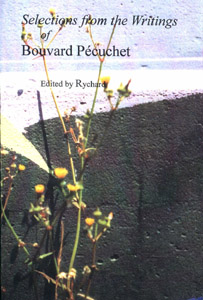
Selections from the
Writings of Bouvard Pécuchet
Edited by Rychard
Cover photo by S. Mutt
2003 Sebastopol
With rare exception, every major study of the Plagarist
Movement includes passing reference to the writings of Bouvard Pécuchet.
In A Brief History of the Plagiarist Movement, Whitler Pratphall, a leading authority on this
movement to end movements, writes, “The work of Bouvard Pécuchet
animates the abstract; he speaks to the cosmic in us.”
Bouvard first came to the
public’s attention with the publication of The Plagarist Years:
1982-1986, which included poems such
as:
AT
DAWN
I
take endless journeys in russet light,
moving
through a landscape of love again
without
ever finding the wind source.
I
am surround by a miracle of clouds.
My
memory is as heavy as a clear winter,
and
my heart is an azure tumult.
His talent won him a prominent place
among the Plagarist writers of the San Francisco scene. He became friends with
A.P. Orria, Roberta Soltea, and Isabel Reznimchemko, and he contributed to Big
Mag.
There is a baroque humor in his works.
Whether he writes about another author or forges an original creation,
Pécuchet’s style is characteristically a self-characterization of
itself, yet his irony instructs and his humor lightens the burden of our
existence.
EIGHTY WORDS FOR WIND
a
foreward to David Bromige’s Indictable Suborners
David
Bromige’s writing is rainfall in the silence. It is easy to mistake the dream for the real, the
unsubstantial for the concrete, and the narrator in “Indictable
Suborners” reminds me of Lycius in Keats’s “Lamia”:
His phantasy was lost, where
reason fades,
In the
calm’d twilight of Platonic shades.
Reading
this poem is like joining Apollo and Dionysius on the soccer field. The poem,
the story, enchants me on one level and alienates me on another. I am
challenged to go beyond the actual, to lose all my plastic, to shed
identity, and to get lost in a
transcendent bog, where all is new, exquisite and bright. In a careful read I
undergo a transformation, guided not only by the artist’s passion but by
the cold philosophy of his sciential brain.
The
poem’s narrative movement is geographical and autobiographical, but
(Wittgenstein, be my Virgil) there is an inner architecture
background
tower or arch or strut(.)
With
mythic memory, the narrator moves from city to city, muttering in Nottingham,
pissing in a doorway in Voorst, swatting mosquitoes in Rapperswill, trudging up
Cricklewood Broadway, subliminally assembling a domain. He creates a world
warmed by an inner sun. The material of the poem is an affirmation of love.
I
took the poem with me on vacation. I was on Kauai, water breezes, land breezes,
fragrant fern wind bringing a whiff of coconut oil from the sunbathers,
daydreaming about the 15th century and the cult of lyric poetry,
whose pretense is to escape social penetration.
Joan
of Arc is cast out for, among other abominations, wearing men’s clothing,
her judges are determined to get her to change, and she’s condemned in
much the same way the Elder Bush condemned John Walker Lindh for wearing his
hair long, saying, “I can think of no worse punishment than to bring him
home and make him keep his hair like that.”—Overheard, waiting in a checkout line, “They don’t
believe in God; they believe in Allah.”—Attorney General John
Ascroft holds onto his face, doesn’t let his face slip—God has many
faces, can his be one?
Oke ola
no’ia o kia’ a loko
Look for the life within
Kiei
ka’ula nano i ka makaui
Peer towards Ka’ala,
look at the wind
Ho’olono i ka halulu
oka Maluakele (pa)
Heard is the roaring wind
Maluakele
I
watch an old man sweeping the sand with a metal detector, and I’m
wondering if he’s found anything good, when he stops and stoops to sift
for a dime. A boy in red trunks faces him, fascinated by the mystery of
trickle-down economics.
And what
does this have to do with Minoan civilization and the price of gasoline? I took
“Indictable Suborners” to read on the beach. The poem begins:
“And hands comb some one annual rainfall in the silence after laughter in
Brandenburg.”
The
narrator admits he communicates his needs without the independence, the
clarity, the definiteness of logic, moving his emotional flotsam to Cedar
Rapids, even though there are very few cedar to see. He follows the one, two,
three of reality into an elysium of prelexical attention, hissing and
blanching, as he sails andspells from Kakamari to
Mogadouro. I found myself nodding in the half-flight, and I realized, here is
more than a tint of manic expressionism, and I wondered if I could make it
fully across his riverrun.
I
reread the first line, “And hands comb some one annual rainfall in the
silence after laughter in Brandenburg.” I placed my identical foot in the
Heraclitian river and felt a tickle:
Sable arrested a fine comb.
Jack
Spicer’s message finally penetrated—the letters growing like
palm-trees in a cold wind.
Ua Hana’ ia ai pono
a pololei
That which is done is true
and correct
Ua haina’ia a kuno
‘ia ‘oe
That which is spoke stands
before you
I
laid “Indictable Suborners” aside and decided, I’ll make a
cup of tea, put on sun screen and walk on broken legs
across
a great civilization in decline, singing the songs of Spring
March 21, 2003
Poipu
Beach